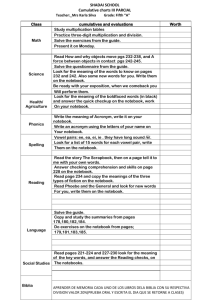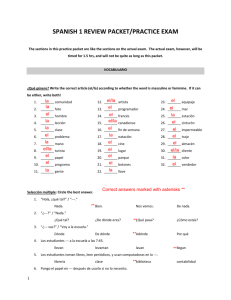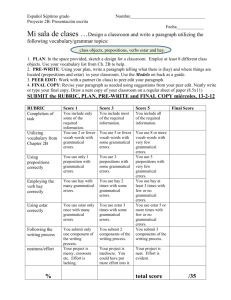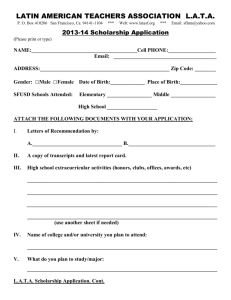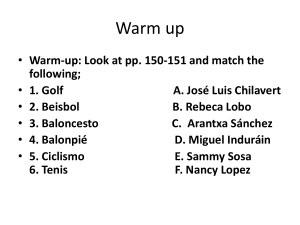Slide 1 - Rachel Hawkes
advertisement
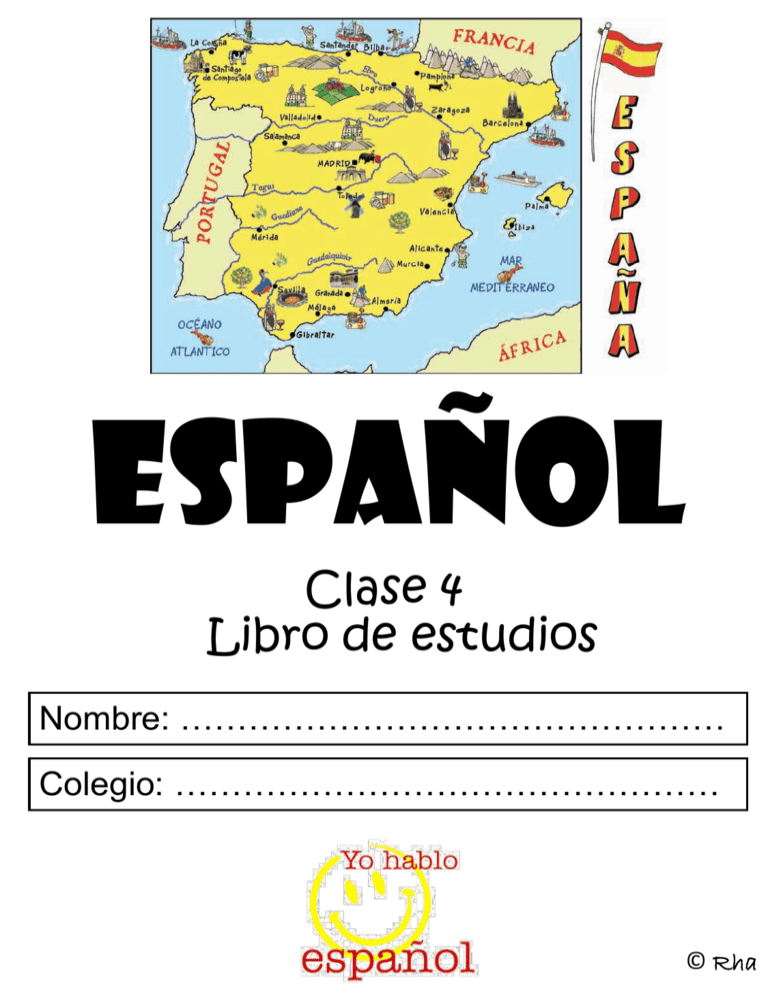
Español Clase 4 Libro de estudios Nombre: ………………………………………… Colegio: ………………………………………… © Rha Contents page El sistema fónico y la pronunciación (Phonics and pronunciation) 1-2 Cómo saludar (Greetings) 3-4 En clase (In the classroom) 5-6 Los números 1-31 (Numbers 1-31) 7-8 ¿Cuántos años tienes? (How old are you?) 9 Los meses del año (The months of the year) y los días de la semana (The days of the week) 10 Los días de la semana (The days of the week) y los números 1-31 (Numbers 1-31) 11 Los meses y las estaciones (The months and the seasons) 12 Las fechas (Dates) 13-14 ¿Cuándo es tu cumpleaños? (When is your birthday?) 15-17 Repaso (Revision) 18-19 Los colores (colours) 20-21 Las formas (shapes) 22-23 La cara (the face) 24-25 Las partes del cuerpo (the parts of the body) 26-30 La familia (family) 31-38 ¿Cómo se escribe? (How do you spell that?) Descripciones (descriptions) Mi vocabulario (My vocabulary) End of Y4 assessment 39 40-43 44 45-46 2 3 4 idea 1 araña 5 elefante 6 universo 9 7 cerdo 10 coche 13 España olvidar cucaracha 14 zumo 8 casa ciclista 11 gimnasia 15 gusano 12 hamburguesa 16 llave 1 Tips for pronouncing Spanish More good news about Spanish pronunciation is that the consonants obey the rules too, although people do speak with different accents, depending on their region and background. c's and z's c + e = th cero, once c + i = th cinco, gracias z + a, o, u = th zapato, corazón, azul c + a = ka casa, catorce c + o = ko cómo, color c + u = ku Cuba, cubano ¡Jajaja! j's and g's J, as in jardines (gardens), is a harder, stronger version of the English 'h'. G, when followed by e and i, sounds exactly the same as j. Otherwise, it is pronounced as the English 'g' in go. ll's The double ll, as in calle, is another characteristic Spanish sound. In most parts of Spain it's like the 'lli' in the English million. h’s The h is silent in Spanish, so you won’t be blowing any candles out when you pronounce words that begin with this letter. Best to imagine it’s not there and pronounce the second letter in the word. hablo, helado, ¡hola!, huevo Try saying these out loud: amarillo octubre familia catorce garaje 2 Como saludar Greetings ¡Buenos días! Good morning! ¡Buenas tardes! Good afternoon! ¡Buenas noches! Good evening! ¡Hola! Hello! ¡Adiós! Goodbye! ¡Hasta luego! Bye! por favor please gracias thank you ¿Cómo estás? OR ¿Qué tal? How are you? ¿Cómo está Usted? How are you? (formal) Estoy….. I am… fenomenal great bien good/fine regular ok mal bad ¡fatal! awful! 3 Cómo saludar Fill in the gaps and practise saying all the words with a partner using ‘look, cover, say, check’ to memorise the words. ¡B_en_s d_ _s! ¡H_l_! ¡A_ió_! ¡H_ s_ a l_ _ go! ¡B_en_s t_ _ d_s! ¡B_en_s _ oc_ e_! Estoy m_ _ bien Estoy b_ _ _ ¿C_m_ e_t_s? Estoy r_g_l_r Fe_o_e_a_ Estoy m_ _ Fa_ a_ 4 En clase Write the correct instruction in each box. ¡Dibujad! ¡Escuchad! ¡Escribid! ¡Hablad! ¡Levantaos! ¡En parejas! ¡Sacad las cosas! ¡Mirad! ¡Sentaos! 5 En clase Without looking at the previous page, draw each instruction. ¡Hablad! ¡Mirad! ¡Levantaos! ¡Escuchad! ¡En parejas! ¡Sacad las cosas! ¡Escribid! ¡Sentaos! ¡Dibujad! 6 Los números 1 - 31 1 uno 16 dieciseis 2 dos 17 diecisiete 3 tres 18 dieciocho 4 cuatro 19 diecinueve 5 cinco 20 veinte 6 seis 21 veintiuno 7 siete 22 veintidós 8 ocho 23 veintitrés 9 nueve 24 veinticuatro 10 diez 25 veinticinco 11 once 26 veintiseis 12 doce 27 veintisiete 13 trece 28 veintiocho 14 catorce 29 veintinueve 15 quince 30 treinta 31 treinta y uno ¿cuántos/ cuántas? How many? más plus menos minus 7 Los números 1 – 31 A Write the numbers in words in the table. Use the syllable square to help you. u e ce di dos si cu te cin in ce on ce ve no a cho e ce ve co ca tor tro do ez tre o te nu 4 = cuatro 13 = 1= 8= 10 = 9= 20 = 12 = 5= 11 = 14 = 2= B Do the calculations and write the answers as a Spanish word. 1. 2. 3. 4. 5. 6. 7. 8. 9. 10. diez + diez = veinte veinte + seis = doce + doce = treinta + uno = diez + diez + diez = veinte + ocho = treinta – tres = treinta – cinco = treinta – ocho = Make up your own! 8 ¿Cuántos años tienes? Write a sentence for each person. Tengo dos años. …..…………………. 12 ……………………………. …..…………………. …..…………………. 15 …..…………………. …..…………………. 6 …..…………………. …..………………. And you? ……….…..………………. 17 9 Los meses del año The months of the year enero January febrero February marzo March abril April mayo May junio June julio July agosto August septiembre September octubre October noviembre November diciembre December Los días de la semana The days of the week lunes Monday martes Tuesday miércoles Wednesday jueves Thursday viernes Friday sábado Saturday domingo Sunday 10 Los días de la semana Los números 1 - 31 Complete the crossword with the Spanish words. 1 4 1 6 2 3 4 5 3 5 2 6 7 Vertical 1 Monday 2 ten 3 Sunday 4 sixteen 5 fourteen 6 twenty seven Horizontal 1 twelve 2 fifteen 3 five 4 Saturday 5 Wednesday 6 Friday 7 eleven 11 Los meses y las estaciones A Write the twelve months in the correct season box. la primavera el otoño B el verano las estaciones el invierno Do the calculations and discover the secret month. A B C D E F G H I J K 1 2 3 4 5 6 7 8 9 10 11 12 13 N O P Q R S T U V W X L Y M Z 14 15 16 17 18 19 20 21 22 23 24 25 26 cinco + cinco = ……… diez + once = ……… diez + cuatro = ……… diez – uno = ……… diez + cinco = ……… The five answers give you five letters which spell the month of ____________ in Spanish. 12 Las fechas A Draw a line to match up the dates. 15.2 10.10 27.11 4.3 22.5 15.8 1.7 8.12 31.1 2.5 12.9 30.4 B Write the dates out in words. el primero de julio el diez de octubre el doce de septiembre el quince de agosto el quince de febrero el dos de mayo el veintidós de mayo el veintisiete de noviembre el treinta de abril el treinta y uno de enero el cuatro de marzo el ocho de diciembre el veinticinco de marzo 1. 25.3 _________________________________________ 2. 4.10 _________________________________________ 3. 11.2 _________________________________________ 4. 3.8 __________________________________________ 5. 27.4 _________________________________________ 6. 16.9 _________________________________________ 7. 11.1 _________________________________________ 8. 17.12 ________________________________________ 9. 21.6 _________________________________________ 10. 13.5 ________________________________________ 11. 7.7 _________________________________________ 12. 23.11 _______________________________________ 13 Las fechas Complete the sentences with the correct dates in Spanish. 1) Write when your birthday is: Mi cumpleaños es el _______________ _____ __________________. 2) Write when your friend’s birthday is: El cumpleaños de (name)______________es el ___________ ____ ______________. 3) Write when your teacher’s birthday is: El cumpleaños de (name)______________es el ___________ ____ ______________. 4) Write when Christmas is: La Navidad es el _________________ _____ _______________________. 5) Write when Halloween is: Halloween es el ___________________ ______ _____________________. 6) Write when Bonfire Night is: La Noche de Guy Fawkes es el ____________ ______ ___________________. 14 ¿Cuándo es tu cumpleaños? A Sing the Happy Birthday song. Try to memorise it so you can sing it without reading the words. Cumpleaños feliz Cumpleaños feliz Te deseamos todos Cumpleaños feliz B Choose at least 5 people from your friends and family and write their names and the dates of their birthdays in the calendar below: Cumpleaños de mi familia y mis amigos enero febrero marzo abril mayo junio julio agosto septiembre octubre noviembre diciembre 15 ¿Cuándo es tu cumpleaños? Choose different identities and have conversations with a partner. Nombre: Pablo Edad: 9 años Cumpleaños: 1 / 8 Nombre: Emilia Edad: 8 años Cumpleaños: 12 / 3 Nombre: Ricardo Edad: 13 años Cumpleaños: 21 / 4 Nombre: Mia Edad: 11 años Cumpleaños: 2 / 5 Nombre: Tomás Edad: 12 años Cumpleaños: 12 / 2 Nombre: Silvia Edad: 7 años Cumpleaños: 24 / 9 Nombre: Miguel Edad: 14 años Cumpleaños: 3 / 10 Nombre: José Edad: 10 años Cumpleaños: 13 / 6 Nombre: Marco Edad: 15 años Cumpleaños: 20 / 11 Nombre: Felipe Edad: 6 años Cumpleaños: 4 / 8 Nombre: María Edad: 12 años Cumpleaños: 14 / 1 Nombre: Catalina Edad: 9 años Cumpleaños: 28 / 10 Nombre: Ana Edad: 10 años Cumpleaños: 27 / 6 Nombre: Sofía Edad: 11 años Cumpleaños: 25 / 5 Nombre: Andrés Edad: 9 años Cumpleaños: 10 / 10 ¿Cómo te llamas? ¿Cuántos años tienes? ¿Cuándo es tu cumpleaños? Make sure you know how to ask these questions off by heart! 16 ¿Cuándo es tu cumpleaños? A Write out the dates below in full in Spanish. 05/06 el doce de febrero 12/2 10/3 2/10 15/07 25/09 B Read the email from David. Write a reply with your name, your age and your birthday. ………………………………………………………………………………………………… ………………………………………………………………………………………………… ………………………………………………………………………………………………… ………………………………………………………………………………………………… ………………………………………………………… 17 Repaso Choose an identity and have a conversation with your partner. Make sure you can ask and answer all the questions confidently. Nombre: Alicia Edad: 9 años Cumpleaños: 2 de mayo Nombre: Sol Edad: 12 años Cumpleaños: 13 de agosto Nombre: Francisco Edad:11 años Cumpleaños: 29 de enero • • • • • • say hello / goodbye say what your name is say how you are feeling say your age say when your birthday is ask 4 questions (name, how you are, age, birthday) Nombre: Elena Edad: 10 años Cumpleaños: 17 de marzo 18 Repaso A Write these months in English. febrero marzo junio octubre mayo enero septiembre agosto B Write these months in Spanish. June December February July January October March April C Write these numbers in Spanish. 5 23 30 14 12 31 16 15 D Write answers to these questions in Spanish. Question Answer ¿Cómo te llamas? ¿Qué tal? / ¿Cómo estás? ¿Cuántos años tienes? ¿Cuándo es tu cumpleaños ? 19 Los colores Los colores The colours azul blue verde green marrón brown gris grey negro/a black blanco/a white rojo/a red amarillo/a yellow de color rosa pink de color naranja orange de color violeta purple ¿Cuál es tu color preferido? Mi color preferido es azul como tus ojos… 20 Los colores Colour the boxes and write the names for the secondary colours. rojo + blanco = rosa negro + blanco = ____ azul + amarillo = ____ rojo + azul = ____ rojo + amarillo = ____ azul + amarillo + = ____ verde + rojo 21 Las formas A Colour each shape and write its colour in Spanish after the noun. un círculo …………. un punto …………. un triángulo ……………. una línea …………. un cuadrado ……………… una estrella ……………. un rectángulo …………… una espiral ………….... un óvalo …………. un ojo …………. B Draw a quick picture made up of different shapes and label it in Spanish. 22 Las formas A Write a phrase for each picture, describing the shapes you can see in it. 1 Hay tres círculos, cuatro triángulos, dos rectángulos y un semicírculo. 2 Hay un círculo, un triángulo y cinco rectángulos. A B C 3 Hay tres triángulos, y una línea ondulada. 4 Hay tres círculos y muchos triángulos. D B Write a description of the three pictures below. 1 2 ……………………………… ……………………………… ……………………………… ……………………………… ……………………………… ……………………………… ……………………………… ……………………………… ……………………………… ……………………………… ………………………………. ………………………………. 3 ……………………………… ……………………………… ……………………………… ……………………………… ……………………………… ………………………………. 23 La cara A Label the face with the correct Spanish words. Use the correct word for ‘the’ – el or la. la ceja la mejilla el mentón nariz pelo diente oreja boca cabeza B Which part of the face is missing? Write the Spanish word here. ___________________ 24 La cara A Draw features onto each face and colour them. (You don’t have to use normal colours!) ………… ………… ………… ………… ………... ………………………… ………………………… ………………………… ………………………..... ..................................... ………… ………… ………… ………… ………... ………………………… ………………………… ………………………… ………………………..... ..................................... ………… ………… ………… ………… ………... ………………………… ………………………… ………………………… ………………………..... ..................................... ………… ………… ………… ………… ………... ………………………… ………………………… ………………………… ………………………..... ..................................... B Write 2-3 sentences about each face. 25 Las partes del cuerpo Complete the labels with the correct words. Don’t copy…Look, cover, write and check. el pie el brazo la pierna la mano los hombros la cabeza el codo el dedo el estómago la rodilla 26 Las partes del cuerpo The parts of the body la cabeza head la espalda back la mano hand la pierna leg la rodilla knee la nariz nose las orejas ears el estómago stomach el brazo arm el dedo finger el pie foot los dientes teeth los ojos eyes el codo elbow los hombros shoulders 27 Las partes del cuerpo Try to write as many of the parts of the body words from memory as you can. Check for any you cannot remember and write them in with a different colour pencil. 28 Las partes del cuerpo A Complete the word puzzle, using the picture clues. B Add more body part words to the puzzle where there are spaces, if you can. 29 Las partes del cuerpo Colour in the aliens and write two or three sentences about each one. 1 2 ……………… ……………… ……………… ……………… ……………… ……………… ……………… ……………….. 4 3 5 ……………… ……………… ……………… ……………… ……………… ……………… ……………… ……………….. ……………… ……………… ……………… ……………… ……………… ……………… ……………… ……………….. ……………… ……………… ……………… ……………… ……………… ……………… ……………… ……………….. 6 ……………… ……………… ……………… ……………… ……………… ……………… ……………… ……………….. ……………… ……………… ……………… ……………… ……………… ……………… ……………… ……………….. 30 La familia un hermano a brother una hermana a sister un padre a father una madre a mother los padres parents una abuela a grandmother un abuelo a grandfather unos gemelos twins un gemelo a twin brother una gemela a twin sister (una)hija única an only daughter (un) hijo único an only son un medio hermano a half-brother una media hermana a half-sister un hermanastro a step-brother una hermanastra a step-sister un padrastro a step-father una madrastra a step-mother 31 mi padre mi madre mi hermano mi hermana ¿Tienes hermanos o hermanas? No, soy hija única… 32 La familia A Write in the Spanish family words in the correct boxes. Don’t copy. Look, cover, write and check. 1. 2. 3. 4. 5. 6. 7. 8. father mother parents brother sister family grandfather grandmother la familia el abuelo la madre la hermana el hermano el padre los padres la abuela B Complete the grid with the Spanish words. 1 2 3 1 family 2 father 3 sister 4 4 pet / animal 5 5 grandfather 6 6 family 7 7 mother 33 La familia José Carmen Luisa Paco 82 años 79 años 75 años 44 años Gloria Roberto 42 años 43 años Sonia 14 años ¿Verdad o mentira? Yo Jaime 10 años 12 años Mi padre se llama Roberto. Mi madre se llama Sonia. Mi abuelo se llama José. Mi abuela se llama Luisa. No tengo hermanas. Mi hermano se llama Paco. ¿Cuántos años tienen? 1 Mi abuelo Paco tiene…años. 2 Mi hermana ……… 3 Jaime……… 4 Mi abuela Carmen………. 5 Mi padre……. 6 Yo tengo….. 34 La familia ¿Tienes hermanos o hermanas? A Match the pictures to the sentences. 1 a Tengo dos hermanas. 2 b Tengo un hermano y dos hermanas. 3 c Tengo tres hermanos. 4 d Tengo un hermano. 5 e Soy hijo único. 6 f Tengo dos hermanos y una hermana. 7 g Tengo un hermano y una hermana. 8 h Tengo una hermana. B Write a sentence for each picture. 1 2 3 4 5 35 La familia A Read about Maya and complete the details in English. Me llamo Maya y tengo diez años. Mi cumpleaños es el 15 de julio. Mi madre se llama Roberta. Mi padre se llama Eduardo. Tengo dos hermanas que se llaman Victoria y Alicia. Alicia tiene dieciséis años y Victoria tiene cinco. No tengo hermanos. Name: Age: Birthday: Name of dad: Name of mum: Victoria’s age: Extra - two more details: B Complete the sentences in Spanish. 1 Roberta es la ____________ de Maya. 2 Su padre se llama _____________. 3 Alicia es la _________________ de Maya. 4 Maya tiene ____________ años. 36 La familia A Look at the family tree and complete the sentences with the correct names. 1 El padre de Bart se llama ________________ 2 El hermano de Homer se llama __________________ 3 Las hermanas de Marge se llaman ________ y _______. 4 La madre de Marge se llama ________ . 5 El abuelo de Lisa se llama ____________. 6 La hermana de Lisa se llama ______________. 7 La madre de Maggie se llama ____________. 8 El hermano de Lisa y Maggie se llama _________. 37 How to say ‘a’, ‘some’ and ‘the’: definite and indefinite articles un a (masculine object) una a (feminine object) unos some (more than one masculine object) unas some (more than one feminine object) el the (masc object) la the (fem object) los the (more than one masc object) las the (more than one fem object) NB: Sometimes the article is not needed in Spanish: e.g. No tengo hermanos = I haven’t any brothers or sisters Completa la tabla abajo. un padre a father el padre a mother la madre some parents! the father the parents una hermana the sister a brother a grandma el hermano the grandma 38 ¿Cómo se escribe? A Choose a famous person to be. Your partner will ask you what your name is “¿Cómo te llamas?” And how do you spell that: “¿Cómo se escribe?” El alfabeto español Me llamo David. Se escribe D-A-V-I-D A a J jota R erré B bé K ka S essé C thé L ellé T té D dé M emé U oo E é N ené V oobé F effé Ñ eñé W oobé doblé G jé O o X H aché P pé Y I ee Q koo Z ekees ye theta B Choose an animal. Spell out the Spanish word for it and your partner will tell you which animal it is. 39 Descripciones A Colour in the eyes. B Colour in the hair. Tengo el pelo… Tengo los ojos …. negros marrones castaño rubio rojo negro azules verdes morados C Match up. D Draw. Llevo… barba Tengo los ojos Tengo los ojos verdes y el pelo marrones y el pelo corto, liso y rubio. largo, rizado y negro, . gafas bigote Tengo los ojos rojos y Tengo los ojos negros y el pelo largo y verde. el pelo ondulado y gris. 40 Descripciones A Read the descriptions. Colour and draw. Tomás tiene los ojos verdes. Tiene el pelo corto y rizado. Tiene el pelo rubio. Elena tiene los ojos grises. Tiene el pelo largo y ondulado. Tiene el pelo rojo. B Draw and colour yourself. Describe you. 41 Descripciones A Read the eye descriptions. Colour in. 1 2 3 los ojos azules los ojos marrones 4 los ojos grises los ojos verdes B Read the hair descriptions. Colour in. 1 2 el pelo negro el pelo castaño 3 el pelo rubio 4 el pelo rojo C Write these sentences in English. 1 Tengo los ojos azules y el pelo largo, rizado y negro. 2 Tengo los ojos marrones y el pelo corto, rizado y castaño. 3 Tengo los ojos verdes y el pelo largo, liso y rubio. 4 Tengo los ojos grises y el pelo rojo. 42 Descripciones Fill in the table with the missing Spanish or English words. Use the word table to help you, if necessary. Tengo el pelo …………… I have got………… hair. rubio negro brown grey rojo liso wavy curly corto largo mediano mid-length Tengo los ojos …… I have got ……… eyes. marrones azules verdes grises tengo gafas tengo ____________ tengo barba blond short red long blue black straight brown glasses I’ve got ____________ I’ve got a moustache. I’ve got a ___________ green beard grey bigote castaño gris ondulado rizado 43 Mi vocabulario 44 KS2 Programme of End of Year 4 Study 2014 (P1 -, =, +) Listen attentively and Ask and answer confidently questions about birthdays, ages, dates, time, times tables and show L1 understanding simple calculations Play Hide and Seek in Spanish by joining in and responding Link the spelling, sound and Develop phonics knowledge and confidence through: days in the month rhyme, Christmas L2 meaning of songs (Rodolfo el reno, Frosty, Navidad), birthday songs words Ask / answer questions about birthdays, ages, dates, times, simple maths Ask ‘¿Cómo se dice … en español? ¿De qué color es (What colour is)? ¿Cuántos ... hay? (How many... are there?) ¿Qué día es (hoy)? (What day is it (today)? ¿Qué fecha es (hoy)? (What date is it (today)? S1( Ask and answer ¿Cuándo es tu cumpleaños? (When is your birthday?) ¿Cómo se llama? (What is he/she called? a) questions ¿Cómo se escribe? (How do you spell that?) ¿Tienes..? (Do you have..?) ¿De qué color son tus ojos? (What colour are your eyes?) ¿Cómo tienes el pelo? (And your hair) S1( Express opinions and respond to Use: En mi opinión (In my opinion), Pienso que (I think that) b) those of others S1 Ask for Signal a problem: Señor(a), tengo un problema clarification and Ask for help: ¿Puede ayudarme? © help Speak in S2 sentences Use these sentence structures: Mi cumpleaños es el…de.. / Son las dos – es la una / Hoy es el …de… (Ayer fue el…de… Mañana será el …de…) Empieza a las… / Termina a las… Es / No es Tiene / No tiene Hay / No hay Describe people, places, things Describe pictures/paintings in terms of shapes and their position Describe hair / eyes of self and others S3 and actions orally (to a range Birthday survey, songs of audiences) 45 R1 read and show understanding of words, Spot the Dog story, Perritos Reading and understanding details on birthday invitations, diary phrases and simple texts entries and list of things to do (to prepare for a party) R2 appreciate stories, songs, poems and rhymes in the language Numbers song, birthday and Christmas songs, Pocoyo video episodes, months / days rhymes Numbers R3 read aloud with accurate pronunciation Read and add questioning intonation understand new words that are R4 introduced into familiar written material Otra vez (again!) / Todos preparados – qué voy (Coming ready or not!) / Pocoyo, birthday vocabulary, verbs, seasons, numbers 13-31, festive vocabulary, instructions for making a piñata R5 use a dictionary W1 write words and phrases from memory Write short exclamations and questions with from memory with correct position of punctuation marks in questions (and exclamations), on mini-white boards from short-term memory (e.g. in response to Pocoyo videos) Write ' My birthday es on the … of …' from memory with accurate spelling. W2 adapt phrases to create new sentences Animal maths Create birthday and Christmas cards, plan and write party invitations including time / date /, making plans for a party – to do list - using ‘Voy a + verbs’, time exercise W3 describe people, places, things and actions in writing Revision – colours and numbers Describing pictures/paintings in terms of shapes and their position Describing emotions – happy, sad Describing hair / eyes of self and others Make birthday cards, Design invites, Create piñata (with resources) G1 Gender of nouns - definite and indefinite articles G2 Singular and plural forms of nouns Focus on active use of indefinite articles in singular and plural and definite articles in both singular and plural G3 Adjectives (place and agreement) Use of plural nouns G4 G5 Conjugation of key verbs (and making verbs negative) Use adjectives (agreement and position) with more confidence Connectives and qualifiers, adverbs of time, prepositions of place Create greater variety of sentences using the key verb forms from Y3. Use tiene (3rd person tener) and está (3rd person estar) Retell story with 3rd person AR verbs (non-explicit focus) Use future tense (Voy a + infinitive verb), infinitives 46
